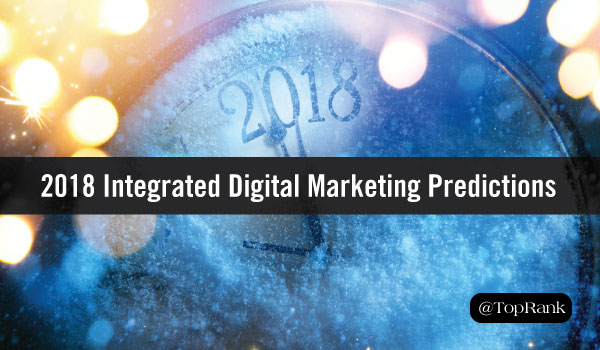
The new year is barely underway and already we’re already seeing significant shifts in digital marketing.
Facebook recently announced their decision to favor friends over brands in news feeds and YouTube has tightened the reins on what channels can be monetized. And this is just within the first few weeks of the year.
Undoubtedly, digital marketing tactics like content marketing, SEO, paid, influencer marketing and social media will all face changes in the coming year. Some of which we’ll be able to predict, and some of which we won’t.
However, today’s best marketers know that individual marketing tactics do not stand alone. Which means that integrated, “best answer” digital marketing strategies will reign supreme. That is why instead of focusing our team’s predictions on how individual tactics will evolve in 2018, we’ve uncovered how the role of each tactic will change as part of the overall digital marketing mix.
The State of Digital Marketing in 2018

Lee Odden
CEO
As we head into the heart of Q1 2018, marketers are just as overwhelmed with tactics as buyers are with content. This paradox of choice at scale incurs costs that range from dissatisfied customers to ineffective marketing programs.
With increasing demands, fewer resources and greater complexity in marketing that now includes smart speakers, VR/AR, IoT, AI and all forms of disruptive technology, marketers are looking for the universal truths that will keep them on track and effective.
In my book, Optimize, I talked about a customer centric approach to digital marketing that emphasized search, social and content. The truths about how customers engage content to make decisions outlined then are equally true in 2018 and for nearly any kind of platform.
Those content truths are: discovery, consumption and action.
Discovery: Where do buyers look for solution information? What do they say to their Echo or Google Home device? What do they search for on their phone or tablet? What sources do they subscribe to for updates on their smart watch? Of course laptop, tablet and mobile search and social media behaviors are still relevant.
Consumption: What are your buyers’ preferences for engaging with the content they find? Do they read/watch/listen on the discovery platform or save/subscribe for later? Are there preferences for experiencing or interacting with content vs. simply read/watch/listen? Images vs. videos vs. audio vs. interactive on various devices is still relevant.
Action: What triggers will inspire action? Do buyers need content personalized on the fly or are they willing to exchange contact information to be fed personalized content? What will it take to motivate share, subscribe, inquire, transact or refer? All still relevant.
Marketers in tune with truths about how customers find, engage with and take action on information will reveal whatever technology, platform, media format and experience buyers need. As part of an ongoing effort to optimize marketing with a customer focus, these truths can help architect successful marketing programs in 2018 and for years to come.
Content Will Experience a Shift in Focus

Nick Nelson
Content Strategist
There’s a distinct movement taking place in content marketing, with the focus increasingly shifting from quantity to quality. With so much volume out there, it only makes sense to spend our time creating fewer assets that will truly stand out, as opposed to larger amounts of unremarkable material. Since content is already integrated with basically every aspect of a comprehensive digital marketing strategy (or should be at least), I foresee this change in mindset applying to every corner — social, paid media, lead nurturing, data analysis, and so forth.
The Impact of Artificial Intelligence

Ashley Zeckman
Director of Agency Marketing
For years marketers have been talking about the importance of customer experience. And for years, marketers have struggled to uncover the information that makes it possible to create a stellar customer experience.
The game changer in 2018? The emergence of Artificial Intelligence.
In 2017, AI finally began to become more mainstream which allowed platforms to begin harnessing its true power for marketing. In 2018, it will become essential that marketers use data collected by AI to make smarter marketing decisions that will allow them to personalize content, create more data informed social media marketing plans and better target SEO keywords.
SEO & UX Will Overlap

Joe Manier
Digital Advertising Manager
What does UX and good design have to do with SEO? Good UX keeps people on the page when they arrive to your site. The same holds true for good copywriting. It’s a one-two punch as people’s search process involves quick scans of copy and page design as they’re determining which result will best serve them.
This is all due to RankBrain, which has been around for a while, but it’s sinking in just how important it is being the 3rd most critical ranking signal. So in 2018, look for SEO to further overlap with UX teams and copywriters as they team up to boost the two main RankBrain components of page dwell time and SERP CTRs.
The Integration of Influencers & Sales

Rachel Miller
Influencer Marketing Manager
I think influencer relations will take on an increasingly bigger role affecting not just marketing but also sales and support. Partnering with the right people gives businesses unfiltered and holistic feedback that when combined with other key data points makes planning and decision making more effective. This increase in importance will require influencer marketing tools, tactics, and practitioners to bring nothing but their A-game.
Content Will Bolster Existing Relationships

Caitlin Burgess
Senior Content Marketing Manager
From compelling ad copy to best-answer blog posts to video on social media — content is the foundation of any digital marketing strategy. Period. And I think we can all agree that won’t change anytime soon. But one thing I see on the rise for content marketing in 2018 and beyond is a refocusing on developing content that aims to bolster and grow existing client/customer relationships.
We’ve all heard the stats on just how much it costs to acquire a new customer versus keeping an existing customer, but content marketing has largely been leveraged to move prospects through the funnel and get that first sale. I think it’s high time marketers developed more robust strategies to nurture after the first check clears. After all, more often than not, B2B and B2C companies alike are more than just one product or service offering—but many of your current customers and clients may not know just what you’re capable of. So, show them.
The Ad Viewing Experience Will Have to Improve

Stephen Slater
Senior SEO & Digital Advertising Manager
Ad blocker adoption grew 30% in 2016 (numbers for 2017 aren’t out yet, but I’m sure they will show continued adoption) and even browsers are getting in on the action.
So, instead of killing display ads as a whole, I predict that this desire to block ads is going to actually help the industry and drive display ad spend. Projections show that display ad spend should grow by about $5 billion in 2018.
Why would people spend all of that money on display ads that will possibly be blocked by their audience? Two reasons:
- Targeting is drastically improving. Programmatic targeting, account based targeting, interest and affinity targeting, and retargeting are all improving and driving more qualified impressions and clicks at a much lower CPC than search ads and most social platforms (for now).
- Display advertising placements have to/and will stop being so awful and intrusive. Publishers that offer ad space have to do better. If they don’t they run the risk of losing traffic. In January 2017, Google penalized sites that have “intrusive interstitial ads” and Google’s amp project is already shaking up ads on mobile devices. If publishers don’t comply they run the risk of losing traffic and losing ad revenue.
So what does this all mean? Even though users will attempt to block ads the CPC, targeting, and improved ad viewing experience will allow display ads to become a bigger piece of the digital marketing mix in 2018.
Content Will Fuel Digital Marketing

Anne Leuman
Copywriter
Content marketing, if it isn’t already, will be driving the digital marketing mix in 2018. After all, the foundation of the internet and the genesis of search were both inspired by content. With this in mind, each component or tactic within the digital marketing mix will need content behind it. This includes influencer marketing programs, social media campaigns, video, events, etc. and anything else you might be adding in the year ahead. Each piece of the mix needs content to fuel it.
Instead of asking how does our content fit in the mix, we’ll be asking how the mix supports our content.
The Combination of Influence & ABM Strategies

Amy Higgins
Strategic Account Manager
The root of influencer marketing is “influence”. You add marketing to the mix, and it leads to how can someone influence a person’s buyer behavior.
I believe that in the next year, we will begin to see that signal of influence move down the funnel and into ABM strategies. Currently, influencer marketing addresses mostly top of the funnel marketing initiatives. In order for this change to happen, marketers need to look at their influencers as extensions of their teams, more community based with deeper collaboration and strategies that benefit all sides of the equation — from the customer to the company, and to the influencer. Influencer marketers will begin to use community growth and acquisition strategies in order to see the largest benefit from their network of influencers. For example, influencer exclusive events influencer newsletters, and community forums are just a few of the tactics that marketers will use when approaching influencers. After all, influencer marketing is a two-way street.
Social Media Can’t Be an Afterthought

Debbie Friez
Influencer Marketing Strategist
First of all, if you don’t have social media as an integral part of your overall digital marketing mix, you need to start now. You can no longer afford to make social media an afterthought.
Social media will share a place at the table with the other areas of the digital marketing mix.
- Influencer Marketing. Everyone wants to do it, but to do it effectively, you need to interact with your influencers on social media. If you are jumping into influencer marketing, you will need to step-up your social media performance.
- Lead Generation. Looking to increase conversion rates? More marketers will utilize Facebook and LinkedIn paid offerings for driving more leads. They have a key advantage, because people like to stay on their preferred social channels.
- Content Marketing. Successful digital marketers will utilize social media in creative ways to drive traffic to their optimized content.
- SEO. Looking to really drive traffic to your website? Integrating social will be necessary to get the most from you overall strategy.
Getting noticed in the digital age can be hard. Social Media is consistently offering new ideas and avenues to stand-out. Let’s see what 2018 will bring us!
What Is Your Digital Marketing Prediction for 2018?
What each of these predictions tell us is that every digital marketing tactic is essential, and has its place. But we’re beyond the point in time where integration is a want, and is now a necessity.
Which of the digital marketing predictions above do you think will have the biggest impact on your 2018 marketing strategy? Tell us in the comments section below.


